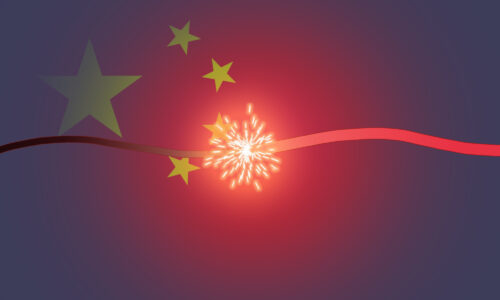A new leader, a sense of malaise, the fear of institutional rot, dilemmas about how to deal with corrupt officials from the old regime, reams of proposals to reform existing policies and patterns of government, uncertainty about whether such ideas can actually be implemented — this pretty much describes the atmosphere in the U.S. today, on Inauguration Day, as Joe Biden replaces Donald Trump in the country’s highest office.
But this was also the atmosphere during another time and place — in 1799 China, after the death of the Qianlong Emperor.
Although the initial decades of Qianlong’s reign marked the beginning of a “prosperous age,” by the late 18th century and the final period of his rule, many acknowledged that things were not quite right. Some worried about the Chinese population outstripping agricultural productivity. Others fretted that Qing governing institutions were outmoded to the challenges at hand. Everyone knew massive corruption, overseen and encouraged by one of the emperor’s favorites, Heshen, undermined the Qing. A rebellion developed in the southwest of the country and could not be eradicated. Problems abounded.
Qianlong’s death, the arrest and execution of Heshen, and the start of the Jiaqing Emperor’s reign promised new possibilities. How could things change?
This is the subject of a wonderful short book by William Rowe, Speaking of Profit: Bao Shichen and Reform in Nineteenth-Century China, a volume that is particularly meaningful to read on this day, as America faces a strange mix of optimism and dread, the end of one administration and the start of another.
Bāo Shìchén 包世臣, a reformer, grew up in the drift and uncertainty of the late Qianlong period. Born in 1775, he later reflected that “by the time I was a young student everything was falling apart. Bribery was pervasive and open, the administration was contaminated and vile, and the people’s energy was taut like a string, as if there might be a rebellion.” Confronted with overlapping crises, he had an eclectic and wide-ranging education, serving as an aide to officials trying to suppress a rebellion, reading about agriculture and the economy as well as legalism. Bao was never a high-ranking official, and he made a living by selling his calligraphy, but he was well-connected — the type of person that high-ranking officials wrote to when they had a question about governance, military affairs, or economic policy.
His overriding concern was reinvigorating Qing governing institutions. In a treatise titled “On Wealth,” written at the start of the Jiaqing period in 1801, he argued it was necessary to “rescue our times.” Bao first called for a fresh start: a general amnesty for prisoners, the pardoning of disgraced officials associated with Heshen, and the forgiveness of debts one part of the government owed to another. He then sketched out a program to strengthen the organs of the central government by bringing back the office of the prime minister to a position of real power and authority. Such a post had laid dormant for a long time.
Bao also wanted to radically change the scope of local governance. The local magistrate, the representation of the Qing government at the county level, paid for his secretaries and assistants out of his own pocket, and the various low-level clerks and runners who helped run the local office did not receive a salary from the Qing government. This meant everyone was on the take. Bribery was endemic and inescapable. Bao’s proposed solution was straightforward. He wanted to bring all these people onto the official payroll. They worked for the government and should be paid by it.
But all these changes would cost money, and Bao had intricate plans on how to change the composition of Qing revenues and expenditures. His overall position defies easy ideological categorization, but one thing stands out: he was a policy wonk. Bao surmised there were a lot of savings to be had from eliminating waste and bribery at all levels of government. He also called for a commercial tax on “all merchants and artisans, pegged to their individual levels of capitalization.” In general, the commercial sector of society was not taxed as much as agriculture. Bao thought that had to change. Reforming the scope of the Qing monopoly on salt and giving more room for commercial distribution would also bring in substantial revenues. But in managing foreign trade, Bao had a streak of “radical protectionism”: overseas trade should be prohibited, foreign merchants expelled, and foreign textiles banned. The revenue to reinvigorate Qing institutions was there, but the Qing government had to make significant adjustments to secure it.
Reading Bao’s proposals brings to mind the plethora of plans, currently in circulation, to reform U.S. institutions. Perhaps appointments to the U.S. Supreme Court should be limited to 18 years rather than a lifetime to lower the stakes of the confirmation process. Perhaps the Senate filibuster should be eliminated so the legislative branch can actually legislate. Perhaps the electoral college should be abolished to better reflect the will of the majority. Perhaps the U.S. government can give “Baby Bonds” to children to help tackle inequality. Perhaps a tax on capital can fund a dramatic expansion of the welfare state. Just as in the early days of Jianqing’s reign, there is no shortage of people telling President Biden what to do.
Perhaps the most resonant similarity between Bao’s plans and proposals today is their essential optimism. As Rowe writes, “Bao was unusually steadfast in his faith in the continuing potential of the empire’s resource endowment and its population to produce wealth and abundance.” More important still, Bao “was equally confident in the capacity of his own literati class to eventually find creative and innovative solutions to the multitude of institutional and situational problems with which the empire was confronted.” He recognized the Qing’s flaws but had faith in its ability to adapt and persevere: “The ancien regime could be saved.”
But we know that did not really happen. Most of his proposals were not implemented, and the Qing dynasty’s problems only mounted across the 19th century. The ancien regime couldn’t be saved.
It is a dark and disconcerting thought in this dark and disconcerting winter.







